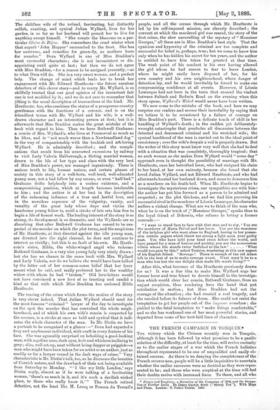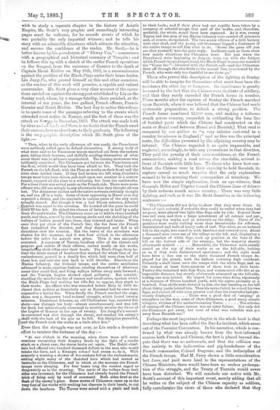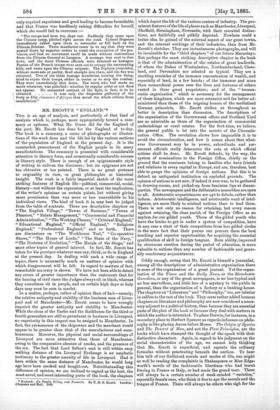THE FRENCH CAMPAIGN IN TONQUIN.*
THE victory which the Chinese recently won in Tonquin, although it has been followed by what promises to be a pacific solution of the difficulty, at least for the time, will revive curiosity as to the earlier stages of a war which the French bulletins throughout represented to be one of unqualified and easily ob, tained success. As there is no denying the completeness of the French reverse now, people will be a little inquisitive to ascertain whether the earlier successes were as decided as they were represented to be ; and those who were sceptical at the time will feel their doubts revive with increased force. To these, and all who wish to study a -separate chapter in the history of Asiatic Empire, Mr. Scott's very graphic and exceedingly interesting pages must be welcome, for he records events of which he heft was probably the only impartial witness ; and he tells his
story with an admirable directness which attracts the attention, and secures the confidence of the reader. Mr. Scott,—he is better known by his pseudonym of " Shway Yoe,"—commences with a geographical and historical summary of Tonquin ; and he follows this up with a sketch of the earlier French operations on the Songcoi, from the successes of Gamier to the death of Captain Henri Riviere on May 19th, 1883, in a reconnaissance against the position of the Black-Flags under their brave leader, Liu Jung-Fa, who proved himself on this and other occasions, as the readers of this work will perceive, a capable and valiant commander. Mr. Scott gives a very clear account of the opera tions carried on against the strong post established by Liu on the Sontay road, where, by a strange fatality, there perished, at the interval of ten years, the two gallant French officers, Francis
Gander and Henri Riviere. The best way to notice this volume is to quote some of the passages referring to the events which attracted most notice in Europe, and the first of these was the attack on Scratp in December, 1883. The attack was made both by Hirer and on land; and there is DO doubt that the Freaela owed their success, here as elsewhere, to their gunboa4. The following is the very graphic description which Mr. Scott gives of the fight :— "Then, when in the early afternoon all was ready, the Frenchmen were suddenly called upon to defend themselves. A strong body of what were said to be Yunnanese troops marched out from the eastern gate, hiding their banners, and skilfully availing themselves of what cover there was to advance unperceived. The turning movement was brilliantly conceived. The Chinamen got between the Frenchmen and the fleet, which would thus have been afraid to fire. They took the French on the left flank, with the Phnc-sa works on their front and the river close behind them. If they had broken the left wing, Courbet's troops must have been driven pell-mell upon one another in a narrow funnel, exposed all the time to a withering fire from the earthworks. For a time there was actual panic on the French side. There were some officers who did not scruple to say afterwards that they thought all was lost. The Annamese coolies and the native servants certainly thought so, and ran off in a body. Some of them appearing in Hanoi next day reported a defeat, and the sentinels in various parts of the city were actually atoned. But though it was a bad fifteen minutes, Admiral Coarbet was equal to the occasion. He hurried all the guns he could --croTs-r. -rn o his left. He risked the chance of being cut in half by a sally from the earthworks. Tim Chinamen came on to within three hundred yards, and then, scared by the bursting shells and the shrieking of the volleys of bullets poured into them, they faltered and broke. When once they got clear of the French line, the fire from the French fleet completed the disorder, and they dispersed and fled in all directions over the country. But the nerve of the attackers was shaken for the moment, and it was four o'clock in the afternoon before the order for assault was given. Then it was unequally executed. A company of Turcos, heedless alike of the threats and prayers and orders of their officers, rushed madly on the works, brandishChg their rifles over their heads. The Black-Flags, from behind the dense covert of bamboos that masked the whole face of the embankment, poured in a deadly fire, which laid more than half of them low, and sent the rest back in wild disorder. Elsewhere the Marine Infantry, the Colonial troops, and the native auxiliaries advanced in more cautious fashion, availing themselves of whatever cover they could find, and firing volleys before every rush forward ; and the Foreign, Legion showed equal gallantry. But notwithstanding the murderous fire of cannon and small-arms, against which the Black-Flags had nothing but rifle-fire to oppose, they stuck to their works. An officer who was wounded before Metz in 1870 declared that neither at Gravelotte nor at Bazenval had he ever been exposed to a hotter fire. When finally the French reached the slope, there was a desperate hand-to-band struggle, which lasted twenty minutes. Lieutenant jehenne, an old Cheltenham boy, received five shots—one through his body—almost simultaneously, and was left. for dead, but miraculously recovered to worthily receive the Cross of the Legion of Honour at the age of twenty. Liu Jung-Fe's secondin-command was shot through the throat, and crushed his enemy's 1\ shill with the butt of his gun as he fell. But discipline prevailed, and the French took the works at a little after five." Even then the struggle was not over, as Liu made a desperate effort to retrieve the fortunes of the day :— "At one o'clock in the morning, when there were still some warriors recounting their doughty deeds by the light of a candle stuck on a claret case, the storm broke out again. The Hakki chieftain had offered two hundred thousand dollars to the man who would retake the lines, and a Kwangsi colonel had sworn to do it. With scarcely a warning a shower of fire-rockets fell on the embankments, setting alight many of the thatched huts which had served as barracks to the Chinamen, and in which at the moment the French troops were sleeping. For four hours long the combat raged as desperately as in the morning. The rattle of the volleys from both sides was incessant, for the Chinamen had already learnt the French trick of firing only by word of command. Both sides fired at the flash of the enemy's guns. Some scores of Chinamen came up to the very foot of the works with nothing but cleavers in their hands, to cut down the bamboos. The Tams were seized with a panic and took
to their heels ; and if their place had not rapidly been taken by a company of colonial troops, that part of the works, and, therefore, probably, the whole, would have been captured. As it was, twenty Turcos and five men of the Marine Infantry were carried off prisoners and, of course, decapitated. The two senior officers of a field battery were shot dead, and the young sub-lieutenant begged a lieutenant of the native troops to tell him what to do. • Serve the guns till you are shot yourself,' was the grim reply. Incidents such as these show how nearly victorious the Chinamen were. Bat just when the Frenchmen were beginning to despair, worn out with the fatigue which French troops cannot stand, the Black-Flags' trumpeter sounded the "Cease fire "—identical with the French call—and the Chinamen drew off through the rice-fields to the second line, unmolested by the French, who were only too thankful to see them go."
Those who peruse this description of the fighting at Sontay will be able to imagine for themselves what must have been the resistance the other day at Langson. Its significance is greatly increased by the fact that the Chinese were destitute of artillery, and that they rarely exceeded the Preach forces in number. /Three months after the capture of Sontay the French marched upon Bacninh, where it was believed that the Chinese had made systematic preparations to defend a strong position. The French forces .numbered 12,000 men, and making a toilsome march across country, succeeded in outflanking the long line of fortified posts which the Chinese had constructed on the main or Royal road between Hanoi and Bacninh) That road is compared by our author to "a very inferior cart-road to a country farmhouse in England ;" and as this was the principal route, the difficulties presented by the adjoining country may be inferred. 'The Chinese regarded it as quite impassable, and neglected, accordingly, to take any precautions in that direction, They paid the penalty of their over-confidence, as the French commanders, making a road across the rice-fields, arrived in
front of Bacninh with little loss. fo those who knew how confident the Chinese were in their capacity to hold Bacninh, its capture caused so much surprise that the only explanation seemed to be in accusing their commanders of treachery. We have now the simple explanation, from an eye-witness, that Generals Minot and Negrier turned the Chinese lines of defence by their arduous march across country.) There was very little fiahtiug, and such as it was Mr. Scott describes in the following sentences :—
"The Chinamen did not delay to show that they were there. In front of each redoubt., if redoubts they could be called when they had no guns, were placed two light-blue flags side by side. Beyond these two red ones, and then a large assortment of all colours and pat-,,, terns along the works, and at intervals on the ridge. Three of the positions were really nothing more than breastworks for riflemen, denticulated and built of heavy sods of turf. The other, on an isolated hill to the right, was cased-in with bamboos and covered over. About a thousand men came out of the village to the left, and, displaying a large 'limber of white flags, took up position at the base of the hill on the farther side of the swamp ; but the majority shortly
afterwards retired Meanwhile, the Chinamen were calmly seated on the top of their works or on the hill-side, looking on as if they were disinterested spectators ; and the sight must have been a fine one as the three thousand French troops deployed for the attack, with the balloon towering high overhead. Presently a shell burst over the troops with the white flags, and on the instant at least three-quarters of them took to their heels. Twenty-five remained with four flags, and commenced rifle-fire at an impossible distance, but shortly afterwards retreated up the hill-side, leaving one man behind. He stayed for some time firing vigorously at a distance of fifteen hundred yards, with his sights probably at a hundred. Four shells were devoted to him, the last berating on the hill about thirty yards behind him. Then his nerve failed, be seized his two flags, and rushed.off with even greater zeal than his comrades had pre viously displayed There was a good deal of 'sniping' at stragglers on the way, some of them Chinamen, a good many simple villagers, victims of the undiscriminating Turco The scheme of cutting-off the Chinese retreat was an utter failure. Not only did the Chinamen get away, but most of what was valuable was got away from Bacninh too."
Perhaps the most important chapter in the whole book is that describing what has been called the Bac-Le incident, which arose out of the Fournier Convention. In his narrative, which is confirmed by what was already known from the best-informed sources both French aud Chinese, the fact is placed beyond dispute that there was no ambuscade, and that the collision was due entirely to the indiscretion and pig-headedness of the French commander, Colonel Dugenne, and the indiscipline of the French troops. Had M. Ferry shown a little consideration last June, and paid more heed to the representations of the Chinese Ministers, there would have been no neeless prolongation of this struggle, and the Treaty of Tientsin would never have been disturbed. We will conclude our notice with Mr.
Scott's account of this important event, merely adding that all he writes on the subject of the Chinese capacity as soldiers, fully corroborates the views of those who declared that they
only required experience and good leading to become formidable, and that France was heedlessly raising difficulties for herself, which she would fail to overcome :—
"The troops had been ten days out. Suddenly they came upon the Chinese camp, pitched right across the road. Colonel Dagenne Immediately called upon them to surrender or fall back on the Chinese frontier. Three mandarins came in to say that they were posted there by superior orders to await the evacuation of the provinces, and that no movement could be made without instructions from the Chinese General at Langson. A message was sent to that -town, and the three Chinese officials were detained as hostages. Parties of the French troops were sent out to occupy the surrounding 'hills, and came upon the Chinese outposts. The Zephyrs (convicts), without more ado or parley, fired straight into them, and the fire was Teturned. Two of the three hostage mandarins, hearing the firing, tried to rejoin their troops, either in terror or to stop the combat. They were immediately shot down. The third, who had made no move whatever, was pistolled—whether by regular order or not does not appear. No connected amount of the fight, in fact, is to bs \obtained It was only the desperate gallantry of the forty or fifty chasseurs d'Afrique that saved the whole column from annihilation."




































 Previous page
Previous page